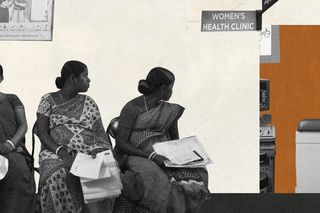
Female Sterilization in Kerala Is Touted as Empowering Women. It’s Really Just Misogyny in Disguise
The state’s soaring levels of gender-based violence, dowry-related deaths, and women’s mental health struggles suggest women still lack autonomy.

The traditional Kerala patriarch with a hairy chest, who rests on the armchair and yells out to his wife for endless cups of tea, has been replaced. The new ‘sensitive man’ sends his daughters to school, allows his wife to vote — and also encourages his wife to opt-out of child-bearing duties through sterilization.
Female sterilization is the most preferred form of contraception for 90% of married women in Kerala, who confirm that it is a decision they make ‘jointly’ with their husband and his family. Further, 98% of the sterilized population of Kerala are women, a majority of them between 25 and 28 years old. These high numbers are often posited as a marker of progress — a direct consequence of the high female literacy rate in the state. In reality, however, they are accompanied by soaring levels of gender-based violence, mainly domestic violence, the practice of dowry, dowry deaths, and women’s mental health struggles.
For comparison, Germany, with a similar rate of female literacy as Kerala, also has the highest rate of female sterilization in Europe — but at 8.4%, it is a fraction of the percentage of women in Kerala who undergo tubectomy (90%).
Contrary to popular belief, the resultant declining fertility rate in the state is not moderation of women’s child-bearing and child-caring duties. Women in Kerala show no trend of starting or resuming formal education nor of entering or re-entering the labor market post-sterilization at an even a vaguely comparable rate. The burden of contraception has simply fallen entirely on the women in the state.
So the modern patriarch even succeeds in presenting tubectomy as a ‘lightening of the load’ and disguising it as benevolent paternalism. It becomes a recommendation offered to a woman who was socialized into perpetually aspiring to become a more dutiful wife to him and a more nurturing mother to his fewer children. The ‘providing husband’ of Kerala is only a colonial myth — it is the women within families that produce surplus labor, the actors needed by capitalism. This oppressive exploitation is sustained collectively by men, thriving in women’s complicity.
This is not to dismiss Kerala women’s agency but instead shed light on the impediments to women’s decision-making power when they negotiate the terms of their reproductive freedom within the bounds of gender subordination, cultural familiarity, and circumscribed choices.
*
The female literacy rate in Kerala quickly ascended from 65.7% in 1981, 75.25% in 1991 to 92% in 2010. According to India’s National Family Health Survey of Kerala (2015-16), 99% of men and 98% of women are literate while only 8-16% of women have autonomy in making decisions about their health care, household purchases, and visits to family and friends. Only 12% of the women there are allowed to visit alone the market, a health facility, or places outside of their community. More than 60% of working women need their husband’s permission to spend the money they earn. Bodily integrity is a universal human right, yet 69% of women in Kerala believe it is reasonable for a husband to beat his wife if she fails to satisfactorily perform her role as a wife, mother, daughter- or sister-in-law to his family members. What is it about our culture that triggers the internalization of servitude and instills an adaptive preference in women that makes them ‘choose’ to accept this violation of a fundamental human right?
Related on The Swaddle:
Hiding Pills, Piercing Condoms, Stealthing — Birth Control Sabotage Takes Many Forms
Using a low fertility rate as an indicator of women’s empowerment while ignoring women’s fear of violence is a possibly deliberate botch on the state government’s reporting. For there to be autonomy and agency, women must have the ability to choose different contraceptive methods with their sexual partners, especially in the face of gendered norms and values that legitimize abuse. Is she reflecting on the norms and rules that are cornering her into choosing tubectomy or is the continued injustice leading her to see herself as a lesser being?
One such norm that bears scrutiny is men’s resistance toward less drastic forms of contraception: Condom use in Kerala declined by 41.7% and male sterilization declined by 90% between 2005-06 and 2015-16. The new ‘sensitive man’ resists using contraception for fear of losing virility and masculinity, which society’s hegemony had taught him is the core of his existence. Besides, the state’s harrowing experience of coerced mass vasectomy in the 1970s as a part of the central government’s mass sterilization campaign left a trauma around the topic of male contraception. This continued aversion towards male contraception — particularly one as reversible as vasectomy — has transferred the burden of population control onto women, with decades of heedless, state-led tubectomy advocacy since the 70s. By 2015-16, roughly half of sexually active adults in the state were not using any form of contraception, while the other half’s contraceptive method of choice was female sterilization.
*
Female sterilization, vasectomy, and hormonal intrauterine devices have similar success rates, but 97.5% of women in Kerala who prefer tubectomy believe it is their safest option. Lack of information, misinformation, cultural familiarity, and women’s lack of resources to compare and evaluate a doctor’s medical expertise are other reasons for this trend. Highly educated women of Kerala with a professional career use other forms of contraception and show less preference for tubal occlusion. With less awareness about the plausible complications and less forethought about future regrets, young rural women in Kerala heavily rely on sterilization.
Giving birth to the number of children desired by the husband followed by tubectomy is a rite of passage for Kerala women. Studies show that post-sterilization, married women in Kerala enjoy a significant increase in freedom of mobility as well as household decision-making autonomy within their patrilocal families. Rewarding women with social acknowledgment — crumps of humanization and semi-independence for accomplishing their life’s purpose of procreation — are just less-discrete forms of benevolent sexism.
According to the Medical Termination of Pregnancy (MTP) Act, 1971, amended in 2002, women in India do not require spousal consent for opting for birth control measures, but it is common for hospitals in Kerala to insist married women provide a consent form signed by their husbands and unmarried women provide a consent form signed by their ‘concerned’ male or ‘caregiver’ male in order to undergo contraceptive procedures or abortion, even in cases of rape. Are hospitals seeking the blessings of patriarchy over respecting the agency and legal rights of women?
Kerala is the Indian state with the highest percentage of female sterilizations conducted by private health centers, with the third-most expensive female sterilization procedure (₹6,742), and the second-highest out-of-pocket share of expenditure on sterilization (96% of total costs are borne out-of-pocket, which is 20% more than the country average). It is worth wondering if the increasing privatization and the neoliberal commodification of health care in Kerala have an impact on the concerning trend of female sterilization.
Related on The Swaddle:
Almost Half of Women In Developing Countries Feel They Can’t Say ‘No’ To Sex: U.N. Report
Kerala has been reproducing colonialism in the form of neoliberalism and obsessive consumerism on the back of its unique form of patriarchy and unspoken casteism. 4% of the sterilizations in Kerala are incentivized, and they are concentrated among Adivasi communities and other scheduled tribes of Wayanad. The total fertility rate — that is, the average number of children born to a woman in her lifetime — of scheduled castes and tribes in Indian is significantly lower than the national average. It is also lower than the total fertility rate of Hindu women in Kerala.
It was not always so. The fertility rate of scheduled castes in Kerala was higher than the fertility rate of Hindus in 1963-64, following which the fertility rate of scheduled castes declined immensely; since 1992-93, it has been alarmingly lower than that of the Hindus in Kerala. The risk of extinction of several groups belonging to scheduled castes and scheduled tribes in Kerala is a matter that calls for urgent political debate. In the state that boasts of high levels of education — while cases of lynching and violence against these minority groups are still gravely frequent — it is important to investigate this disproportionate prevalence of sterilization.
*
British-Bangladeshi economist Naila Kabeer defines empowerment as the “process by which those who have been denied the ability to make strategic life choices acquire such an ability.” Capitalism and the male ‘womb envy’ — that is, the irrational jealousy and fear of female reproductive capacity — are the primary grounds for society’s romanticization of its control over female sexuality and women’s bodies, and for its obsessive need to mediate a woman’s connection with her own body, her property, and her self. The conscious and unconscious denial of women’s negotiation power when it comes to sexual activity, fertility desires, and choice of contraception is indicative of deep misogyny.
The low fertility rate in Kerala is popularly attributed to girls’ education and women’s literacy, but their low labour market participation and political participation prove that education in the state is simply a tool to indoctrinate girls to play their pre-assigned roles as wives and mothers. Transformatory action and liberation can be devised only through education. Introducing a contextualized version of the UNFPA’s Comprehensive Sexuality Education in schools would be an effective way to instill a holistic understanding of gender power relations, agency, and bodily autonomy. The nuances of contraceptive choice are beyond basic awareness about the medical procedure. And teaching girls to make compromises, while not teaching boys to take accountability, only reinforces and builds misogyny higher.
Soja Subhagar is a Berlin-based activist, writer, and critical theorist; she's currently pursuing a Master's in education, gender and international development at University College London.
Related


Healthy Gums May Limit Risk of Severe Covid19 Infection, Research Suggests
